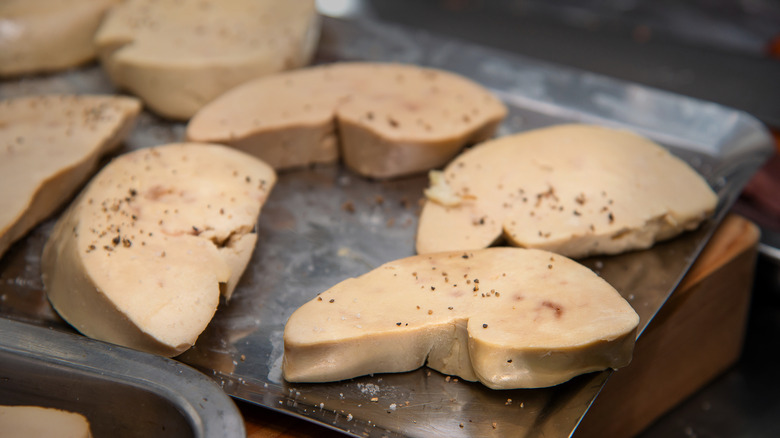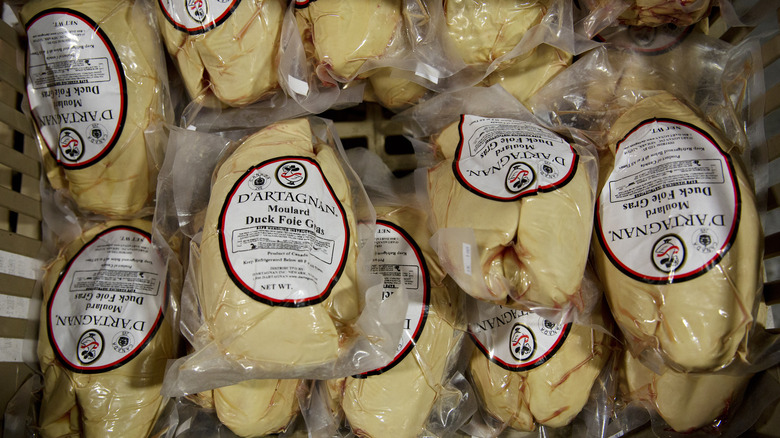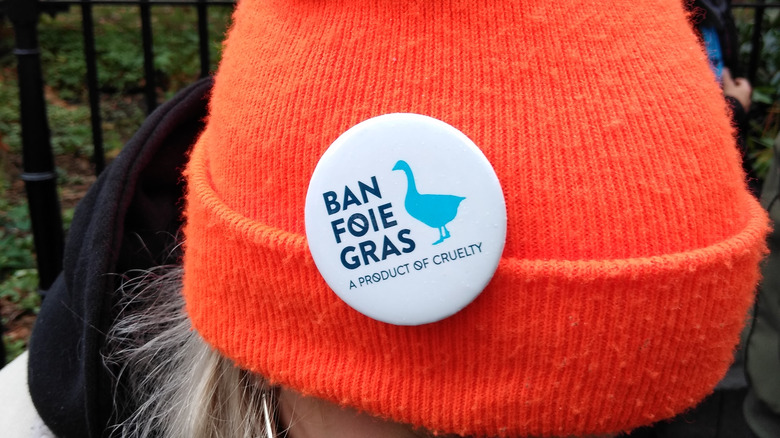Why Foie Gras Is Illegal In So Many Countries
As a French delicacy, foie gras has a reputation as a particularly fancy foodstuff, with high prices to match. But not everyone sees fois gras as a dish for sophisticates; it has become controversial in recent years for the way animals are treated during its production, which has led to it being banned in certain places
To understand these prohibitions, let's take a look at how foie gras is made. The name literally means "fat liver" in French, and it's a pretty literal description of the food: It's the fatty liver of a duck or a goose, seasoned and cooked, and served as a sort of creamy, rich, and buttery mousse that can be served simply with bread or incorporated into recipes.
The controversial part is that the birds are force-fed grains and fat to fatten up their livers for the product. Animal rights groups say this happens through feeding tubes down the animals' throats, causing their bodies to become deformed and potentially causing infections or disease. (There are also complaints about animals being kept in unreasonably small cages, although this likely varies between producers.) Animal rights activists are particularly vocal about foie gras production, but there's legitimate debate about whether foie gras is any worse than other types of meat production — however, the debate over its ethics has led to it being banned in at least a dozen countries.
Foie gras bans are still relatively new, though
Anti-foie gras movements only really appeared in the 21st century, and it took until 2014 for any country to ban it, with India prohibiting foie gras from being imported. A limited number of other countries have followed suit with some level of ban — most of these places are in Europe, where major countries like the U.K., Germany, and Poland (alongside numerous smaller countries) have made foie gras production illegal. Unsurprisingly, considering its role in French culinary culture, France still very much permits foie gras. Farther afield, bans aren't so common but exist in a few countries including Turkey, Australia, Israel, and Argentina.
But not all foie gras bans are made equal, and these laws don't necessarily mean that the delicacy is totally off the table in all of these countries. In many of these countries, it's only the production of foie gras that's banned (so, for example, German farmers aren't allowed to make it). Importing it (and obviously, selling this imported foie gras) is still allowed in many countries with bans, like the U.K., although import bans have still been debated there and in places like Switzerland. The only country-wide import ban in place as of early 2024 is in India, making it the one place where you truly can't get foie gras.
It's also illegal-ish in part of America
While there's no national ban on producing or importing foie gras in the U.S., there have been some fraught attempts to impose such laws in individual states and cities. Way back in 2006, the Chicago City Council banned the sale of foie gras in restaurants. After pushback, this was repealed by the council just two years later. Presumably, a production ban would not have made sense in an urban area where foie gras wouldn't be produced anyway.
New York City attempted a similar sales ban in 2019, but it ended up in limbo. The ban was meant to take effect in 2022, but a court injunction blocked it, setting off a dispute between the city and New York state. The city is still hoping to impose the ban eventually, but foie gras remains available there.
California has had more success in banning foie gras: In 2004, a ban on both sale and production was imposed, but a later court case forced the state to allow sales of out-of-state foie gras. Foie gras production is still banned in California, and you won't see it in restaurants, as residents are still barred from ordering out-of-state foie gras and then reselling it. As recently as last year, Rhode Island instituted an importation ban on products produced through forced feeding of livestock.


